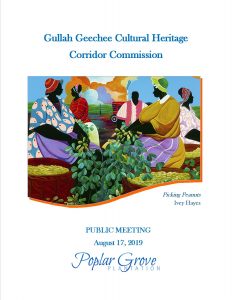June 24, 2020
A vast amount of public research has been conducted to trace the family units of the enslaved men, women and children so named and listed in the 1859 Inventory of Estate of Joseph Mumford Foy, and not surprisingly, these lives are rich with history and documentation.
 The culmination of this public research is based upon an oral interview with Nora Foy Brown in 1982. Only parts of the interview were typed into a transcription, focusing only on Mrs. Brown’s memories of the manor house; however, the cassette tape of her interview filled a sixty-minute tape and was not fully transcribed until 2017 by Executive Director, Caroline C. Lewis. Nora Foy Brown’s interview is one of the only recorded oral history’s of a Gullah childhood pre-WWII in the Gullah Geechee Cultural Heritage Corridor.
The culmination of this public research is based upon an oral interview with Nora Foy Brown in 1982. Only parts of the interview were typed into a transcription, focusing only on Mrs. Brown’s memories of the manor house; however, the cassette tape of her interview filled a sixty-minute tape and was not fully transcribed until 2017 by Executive Director, Caroline C. Lewis. Nora Foy Brown’s interview is one of the only recorded oral history’s of a Gullah childhood pre-WWII in the Gullah Geechee Cultural Heritage Corridor.
To listen to Nora Foy Brown’s interview, click the link below. The full interview has a run time of 58 minutes, and will play first. Smaller clips from the interview, averaging 4 minutes or less, are at the end of the track.
When Nora Foy Brown’s cassette tape interview was transferred to flash-drive in 2017, her memories revealed a treasure of information regarding the tenant farming families who lived and worked on the property throughout the 1920s, ’30s and ’40s. The names of the various men, women, and children assisted the Executive Director’s research using the US Federal Census to create family trees, which led directly to the enslaved persons listed on the 1859 Inventory of Estate of Joseph Mumford Foy.
This tracing back to the enslaved of 1859 led to a presentation by Caroline C. Lewis, Executive Director of Poplar Grove Foundation, Inc., to the Gullah Geechee Cultural Heritage Commission’s Public Meeting of August 17, 2019, held at Poplar Grove, Wilmington, Pender County, North Carolina. The presentation, Intimacy of Oppression Presentation, seeks to provide a context for the purposes of preserving this historic site of a culture that for too long has been unnamed and disappearing at an exponential rate.
We do not forget that there are other vibrant cultures that have had just as a significant and contributing impact upon this area, especially as it relates to the history of Southern culture, who are all an integral part of our our community and its history, including the Waccamaw, Cape Fear, Lumbee and Tuscarora tribes as well as the Cherokees and other indigenous populations, descended from the islands of the Caribbean, South America and Central America, and Mexico.
And thus the collective voices of our community must rise to become Indivisible rather than Invisible.
The Foy family not only benefited but highly profited from the care, skills, talents, artistry and intellect of approximately sixteen enslaved families. Therefore, this historic site seeks to amplify the histories of these Black families who lived and worked at Poplar Grove and contributed their lives and their children’s lives to the settlement, development, culture and history of Wilmington, North Carolina.
Poplar Grove Foundation, Inc. seeks to make available as much public information as possible regarding these individuals, even while such information is not yet connected or part of a larger cohesive narrative other than communicating that a few patterns have emerged that can document Black family ties through successive generations in this particular area of the Gullah Geechee Cultural Heritage Corridor.
Poplar Grove as an historic site continues to collect and make available its collection of documentation of last wills and testaments, marriage, birth and death certificates, US Census records, US Slave Schedules as well as information from the New Hanover County Deeds office, the Freedman’s Bureau, and New Hanover County Cohabitation records, etc.
For a broad overview of public records in North Carolina, visit NC State Archives Slave Records.
From this one recorded interview of Nora Foy Brown, this site makes available the public records specific to Scotts Hill, Pender County, North Carolina, in an effort to create an ever-evolving, all-encompassing narrative of this area, where peanuts, sweet potatoes, blueberries, and melons grew, whose young men served in WWI and WWII, whose mothers cooked for the soldiers at Camp Davis, and whose sons would purchase beach homes at Ocean City, Topsail Island, where their fathers had fished for generations, between ocean and sound, sound and ocean.
We have a history together. Let’s learn it together.
Caroline Lewis, Executive Director, Poplar Grove Foundation, Inc.
The uploading of this research is a continual process.
Please keep checking our website for new information.

